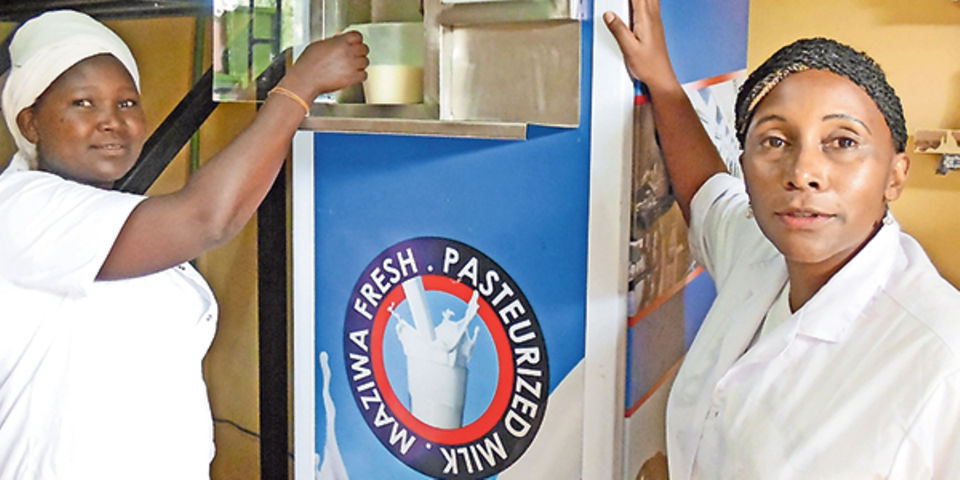Milk ATMs And Milk Pasteurizer Lifts Chamaa Group Fortunes In Meru
For years, farmers in Charuru, Muthara ward of Meru County, relied on tea and coffee, offering little attention to dairy farming.
A majority reared two cows at most for their subsistence and sold the surplus milk to vendors often for as low as Sh30 a litre.
The farmers would always complain and one of their own, Gertrude Imaana, sought to change the tide.
Living and working in Canada where dairy farming is a huge enterprise, Gertrude knew the farmers in her village were sitting on gold and only needed help to actualise their potential.
She started by organising them into a group of 15 members in 2016, and helped them come up with guidelines on how to manage the outfit.
This included electing officials, drafting a constitution, laying down penalties for members who miss meetings or fail to honour their financial obligations.
Members agreed to contribute Sh6,500 as registration fee and remit Sh300 each month, allowing farmers to take loans from the pool.
“We started by collecting the little milk produced and selling locally at Sh50 a litre but we soon discovered a huge demand of the produce in the nearby market centre named Muriri. Each farmer was contributing two to three litres raising up to 70 litres,” recounts Gertrude, who holds a Masters in Education degree.

The group later established five collection points to ensure efficiency in milk delivery, with the number of farmers joining the outfit named Chatime Jabali Group growing to 30.
To avoid adulteration and ensure quality milk, an alcohol test is conducted at the collection centre every time milk is delivered.
Farmers are also advised to observe hygiene practices by ensuring that their milk containers are clean, disinfected, sterilised and dried in the sun.
The farmers are further asked to keep milk awaiting transportation in a shade or in a well-ventilated room. Under warm climate, bacteria in milk grows quickly.
“With the number of milk having surged, we established three selling points; two in Muriri and one in Charuru and bought two small freezers at Sh100,000 from our savings to ensure that the milk is cooled and maintained at temperatures below 4 degrees Celsius,” says Morris Mutuma, the group’s treasurer.
But even with two freezers, Mutuma explains they further acquired a pasteurising machine as milk is highly perishable and can pass pathogens that produce diseases to humans.
DOING AWAY WITH MIDDLEMEN
In September last year, the group achieved a milestone by buying the pasteuriser and a milk ATM, each with a capacity of 200 litres at Sh600,000 — money from their savings, making it the first vendor in the region to pasteurise their milk.
“Pasteurisation is an effective method of killing bacteria in milk and does not reduce its nutritional value making it safer for human consumption,” says Gertrude, who is the chairperson of the group and keeps four cows.
The milk vending machine has helped them actualise their dream of doing away with the middlemen and selling their milk directly to the consumer.
“We are not only able to offer milk in the friendliest and hygienic way, but also we are in a position to preserve the milk in an optimal way while maintaining the flavour and selling to our customers at Sh60 a litre or in any quantity they want. Customers who buy more than 20 litres enjoy a discount of Sh10.”
To mitigate the challenge of getting semen, the group has acquired an eight-litre straw semen tank worth Sh60,000 where they store the product and farmers easily access it.
They buy the semen from Kenya Animal Genetic Resources Centre (KAGRC) based in Nairobi, with the institution supplying the product in the region.
“Breeding was a big challenge since sometimes the semen was collected from poor quality bulls, freezing was also poor due to lack of facilities coupled by poor skills by some extension officers. Limited access to veterinary services further affected productivity resulting to breeding problems to farmers,” Gertrude explains.
She says the group, which is currently competing with the big boys in the region, is transitioning into a co-operative and they plan to also start manufacturing their own feeds.
Some of the milk processors working in Meru are Giant Meru Union, Brookside and New KCC.
“My being away does not cause any vacuum because the treasurer and the secretary manage the group. We also hold meetings by teleconferencing and we have a WhatsApp group,” she says, noting farmers are paid weekly for deliveries.
Romano Kithiki, a member of the group, says initially he had one animal, earning an average Sh3,000 per month but today his earnings have risen five-fold as he has three cows.
Mary Ng’ang’a, a quality trainer with Policy and Market, explains that if farmers take too long to deliver milk to the collecting centre, bacteria multiplication starts as the natural enzyme that preserves milk — lacto peroxides — is only active in the first two hours.
“If the process of collecting, grading and transportation takes more than two hours, bacteria multiplication starts even before the milk gets to the cooling and processing unit forcing it to precipitate, thus, compromising quality.”
****
Get it Quick
Challenges
- Dairy production faces a number of challenges that affect quality and quantity of milk.
- These include limited availability of quality and affordable feeds, inadequate infrastructure including access roads and milk cooling facilities and limited extension services.
- There is also low value addition to absorb surpluses during glut, and limited access to markets and market information.
- Through groups, however, some of the problems can be surmounted.
#MilkATM #MilkPasteurizer #MilkATMKenya #MilkPasteurizerKenya #MilkCooler #MilkCoolersKenya

